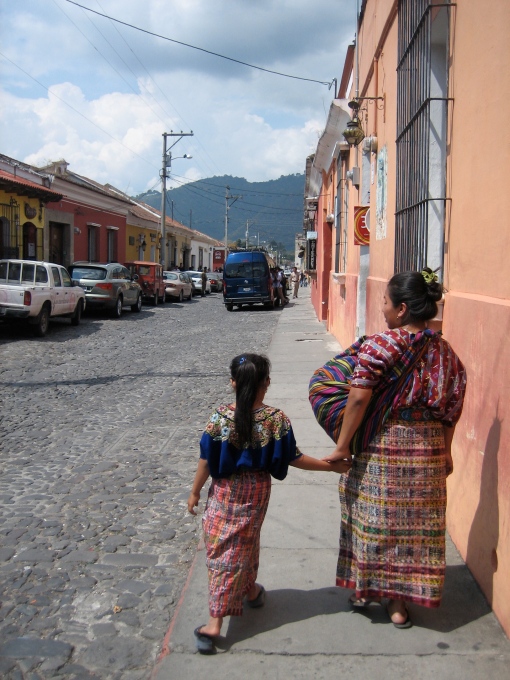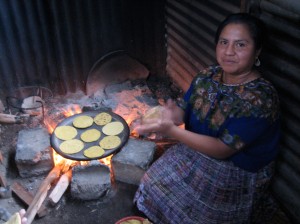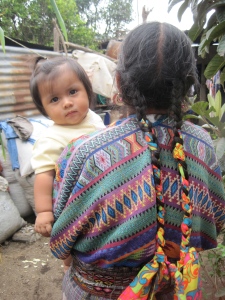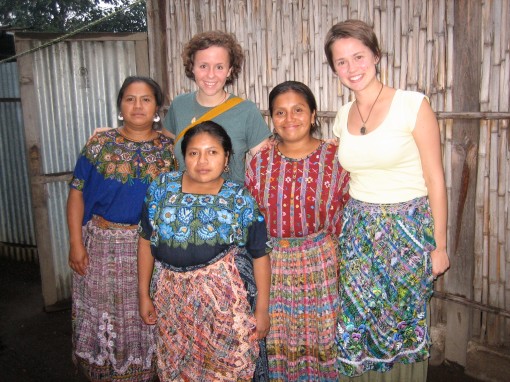Today is the third day that I am accountable to Angélica.
When my fellow student Emily and left to spend our fall break in Guatemala, we went with the educational objective of visiting Casas de Migrantes to inform our understanding of immigration through Guatemala (aaand also with the intention of seeing some sea turtles). As tends to be true a lot in Latin America, plans changed. And had the prospect of five additional hours on a life-threatening bus ride and an unwelcoming priest not deterred us from our original plan, I would have never been changed by la familia Zamora Chavez.
We met Angélica and her eight-year-old daughter Rosemary in the Parque Central of Antigua, one of the most touristy areas of the country. At first she seemed no different than the countless women and children in bright traditional dress who relentlessly attempted to persuade us to buy their bracelets, necklaces, change purses, and scarves. “¡Conocimos esta tarde! ¿Me recuerda?” After we declined to buy, instead of moving on she plopped down on the bench next to us asked if we remembered meeting her earlier. I squinted and recalled a moment in the afternoon, not unlike a million identical moments on this trip, when I had asked her for directions to the park. We made light conversation, eventually meandering to the topic of traditional Guatemalan food – Emily and I wanted her advice as to what authentic dish we could look for, as we had spent the afternoon passing touristy Italian restaurants and burger joints. Her answer surprised us.
“Les invito a mi casa,” she replied – I invite you to my house.
Fast forward through a great night’s stay at a hilariously cliché hostel to us sitting on the same bench in the Parque Central, waiting for Angélica, who was to arrive at 10 am. As the sun intensified we became unsure as to whether she would actually come – but sure enough, nearly an hour later, we spotted her face amongst the bright colors and Mayan patterns of the working women. Of course we assured her that we had not been waiting long at all, and off we went to the market to buy the ingredients as we had agreed on the night before, Rosemary in tow.

After a chaotic weave through the bustling stands and a traumatic trip through the open-air meat section, we boarded the bus to her pueblo: San Antonio Aguas Calientes. After a short ride we found ourselves walking up her street and through a corrugated metal door into her mother’s house. The house was just as I expected it to be based on my two months of experience so far in El Salvador: dirt floors, a fire to cook over, the overwhelming smell of smoke, electricity and a gas stove, no running water, and a bounty of kids and extended family members (the relations of whom would take months to memorize). We were welcomed enthusiastically by Angélica’s sisters, Telma and Milvia, who immediately invited us to join them in cooking a Mayan dish called Pepián.

From roasting chiles to chopping carrots to making tortillas, the women were eager to explain and include us in every aspect of the dish. It was such a fun community effort that we didn’t even notice as three hours passed and our stomachs were grumbling. When we finally got to sit down and enjoy the meal, we learned that Pepián is typically a dish made for weddings, and felt humbled that the family would go to such lengths on an average day just for us.
As we five women lingered at the table, helping ourselves to more rice and just one more tortilla, the family’s story began to emerge. There was no element that I haven’t heard on a weekly basis here – there is not enough work; the men are in the fields all day earning a minimum wage that can’t even stretch to feed the family; in hard times all they have to eat is tortillas and salt. The Guatemalan public school system is so bad that sometimes teachers don’t show up for fifteen days at a time, so they have no choice but to send their children to private school – which costs 400 quetzales (about $50) a month for each child, which is more than papá can even hope to earn. As I looked around at the kids playing so sweetly and helping their parents in every type of work without complaint, the tías told me that there was no way economically that any of the children would be able to attend school past the second grade. And for some reason, in that moment as I was trying to calculate the impossibility of their monthly budget in my head, I began to understand.

Stories of suffering have an interesting effect. As one moves from memorizing statistics to hearing the experiences of individuals, reality definitely becomes more real and human; but a true softening of the heart and opening to solidarity is taking longer for me that I would’ve anticipated. There are many people here that I have come to have great affection for who suffer much, but I have had a hard time pulling forth as much compassion as I would like to be able to offer. Somehow, entering Angélica’s home in such a natural way – meeting in a park, being invited over, and cooking together – evoked an emotional investment in their family’s oppression that broke through the tension I had been stuck behind and invited me to begin to really get it.
Knowing that migration is an inescapable topic here, we asked whether the family had anyone in the United States. The tías admitted that they had considered sending a family member to work there, but had ultimately decided that it was better for the family to stay together and struggle for every meal than to be apart. I attempted to encourage them that I thought they were absolutely right on – that the family’s unity is the biggest priority and that life in the north isn’t all it’s made out to be. But sitting in their kitchen surrounded by the reality of their material poverty, one cannot honestly encourage a family to stay without acknowledging the structural change that would need to happen to make that a possibility for them. Their daily lucha for survival must have an end in sight, or else we give them no choice but to make terrible familial sacrifices and take the horrific risks of migration.
I told the women that I was honored that they opened their home and their story to me, and that I am committed to remembering their family each day as I will return to the United States and work for the change that is needed to alleviate the pain our country inflicts on this part of the world. And in a way I have never meant it before, I am committed to remembering and honoring their family’s struggle. I am more deeply betrothed to the change I will seek through my work and my life, because I am responsible for more than just myself. I am responsible to those in Latin America whom I have loved and who have loved me so well.

I am now accountable to Angélica. Across national, cultural, and economic lines, I am personally accountable to her liberation.
This story, I believe, is my beginning of Love… of Solidarity… of Kingdom and Community. That it would only continue on and become deeper still.
Leave a comment